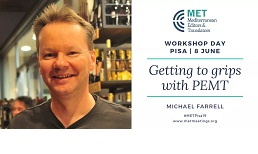Mediterranean Editors and Translators, 2019 Workshops, Pisa, Italy

Getting to grips with post-editing machine translation
To meet the growing demand for translation, post-editing of machine translation output (PEMT) is being increasingly adopted as a mainstream alternative working method. The compelling reason behind this trend is the widely reported increase in productivity compared to human translation together with a comparable and sometimes higher quality level. The skills required for post-editing are different from those needed for the editing of author-written texts and different from those required for translation. This workshop aims to familiarize attendees with post-editing methods by analysing the typical mistakes of both neural and statistical machine translation (MT). It also provides some insight into why certain errors occur in raw MT output through a presentation of the historical development of the technology. It will conclude with a discussion of when PEMT should and should not be used and how raw MT output can be improved through preparatory steps.
 Engaging copy translated literally into English, without taking account of differences in linguistic, semantic and cultural expressions, at best leaves much to be desired and at worst provokes hysterical laughter.
Engaging copy translated literally into English, without taking account of differences in linguistic, semantic and cultural expressions, at best leaves much to be desired and at worst provokes hysterical laughter.
 Thanks to my scientific background, I specialize in technical translations. Over the years I have acquired experience in transcreating advertising copy and press releases primarily for the promotion of technology products.
Thanks to my scientific background, I specialize in technical translations. Over the years I have acquired experience in transcreating advertising copy and press releases primarily for the promotion of technology products.
 All clients of mine who have sent me urgent requests are satisfied with my response.
All clients of mine who have sent me urgent requests are satisfied with my response.